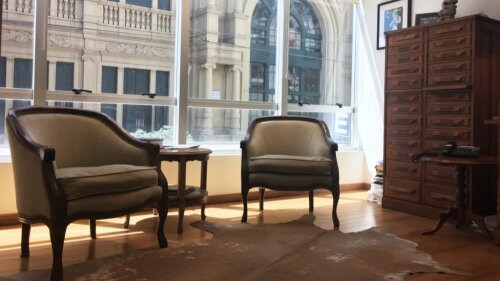Best International Lawyers in Córdoba
Share your needs with us, get contacted by law firms.
Free. Takes 2 min.
List of the best lawyers in Córdoba, Argentina
About International Law in Córdoba, Argentina
International law-related matters in Córdoba, Argentina cover situations where foreign law, cross-border transactions, treaties, or international organizations intersect with Argentine law and local practice. People and businesses in Córdoba commonly face international issues in areas such as immigration and visas, cross-border family law, international trade and customs, foreign investment and arbitration, recognition and enforcement of foreign judgments, and human rights obligations arising from international treaties. Argentina is a party to many international conventions and treaties, and national courts - including federal courts with jurisdiction in Córdoba - apply international instruments alongside domestic law when relevant.
Why You May Need a Lawyer
International matters often involve multiple legal systems, strict procedural rules, and time-sensitive requirements. You may need a lawyer in Córdoba if you are dealing with any of the following situations:
- Immigration, residency, work permits, or asylum requests that require filing complex applications or defending against deportation.
- Cross-border family disputes, such as international custody, parental abduction, or spousal support involving foreign jurisdictions.
- International commercial contracts, distribution agreements, licensing deals, or cross-border sales that require negotiation of choice-of-law and jurisdiction clauses.
- Import-export, customs duties, tariff classification, or regulatory compliance that could trigger fines or seizure of goods.
- Foreign investment, joint ventures, or disputes with foreign partners that may go to arbitration or litigation.
- Enforcement or recognition of foreign judgments or arbitral awards in Argentina.
- Extradition requests, requests for legal cooperation, or criminal matters with transnational elements.
- Human rights or treaty-based claims that could be brought before Argentine courts or international bodies.
Local Laws Overview
Key aspects of Argentine and Córdoba practice that are particularly relevant to international matters include:
- Constitutional and treaty status - International treaties ratified by Argentina are applied by domestic courts and, in many cases, can be invoked directly before Argentine tribunals. Human rights treaties have special prominence in judicial interpretation and enforcement.
- Federal versus provincial jurisdiction - Federal courts handle matters that involve federal law, customs, immigration and many treaty issues. Córdoba has federal courts and provincial courts. Determining the correct forum and jurisdiction is often central to international cases.
- Immigration and nationality - National rules for visas, residency, work permits and naturalization are regulated at the national level. Administrative procedures before the Dirección Nacional de Migraciones are common, and judicial review is possible in many cases.
- Commercial and arbitration law - Argentina recognizes international arbitration and is a party to the 1958 New York Convention on the recognition and enforcement of foreign arbitral awards. Domestic arbitration and mediation are common alternatives to court litigation for cross-border commercial disputes.
- Customs and trade - Imports and exports are regulated by national customs law and trade regulations. Noncompliance can lead to administrative sanctions, fines and seizure of goods, and may involve appellate and judicial review.
- Family law with foreign elements - Cases involving foreign family members or actions taken abroad require careful analysis of applicable law, recognition of foreign documents, and possible involvement of international conventions such as those addressing child abduction.
- Enforcement of foreign decisions - Recognizing and enforcing foreign judgments or public documents typically requires compliance with formalities and sometimes a declaratory proceeding before Argentine courts. Grounds for refusal may include lack of jurisdiction, fraud, or public policy concerns.
- Legal profession and licensing - Lawyers practicing in Córdoba must be registered with the local bar association, such as the Colegio de Abogados de Córdoba, and should have experience in international matters when advising on cross-border cases.
Frequently Asked Questions
How do I find a lawyer in Córdoba who handles international matters?
Look for lawyers or law firms with specific experience in international law topics relevant to your case - for example immigration, international trade, arbitration or cross-border family law. Check professional registrations with the Colegio de Abogados de Córdoba, request CVs, ask for references, confirm language capabilities, and interview potential lawyers about their approach, fees and likely timeline.
Can a foreign judgment be enforced in Argentina - and what is the process?
Yes, foreign judgments can be enforced in Argentina, but they usually require a recognition procedure before local courts. The tribunal will assess jurisdiction, service of process, whether the judgment conflicts with Argentine public policy, and whether it is final and enforceable in the issuing country. Enforcement procedures vary by the type of judgment and the court where recognition is sought.
Are arbitral awards from other countries recognized in Argentina?
Argentina is a party to the New York Convention, so foreign arbitral awards are generally recognized and enforceable in Argentina subject to limited defenses provided by the Convention and domestic law. Enforcement is typically sought before federal courts, and procedural compliance and finality of the award are important.
What should I do if I face deportation or an immigration refusal in Córdoba?
Seek legal assistance immediately. A lawyer experienced in immigration law can review the administrative record, advise on appeals or judicial review, prepare required documentation, and request stays of removal when appropriate. Timing is critical in immigration cases, so act promptly.
How are international child custody disputes handled in Argentina?
Cases with international elements may involve domestic family courts, consular channels and international conventions. If the Hague Convention on the Civil Aspects of International Child Abduction applies, there are specific procedures to secure return or custody orders. Local counsel can advise on whether the convention applies, how to file urgent petitions, and how to coordinate with foreign authorities.
Do I need a local lawyer if I already have a lawyer in another country?
In most cases yes. A foreign lawyer cannot appear in Argentine courts unless authorized. Local counsel can represent you before Argentine authorities, translate and authenticate documents, and coordinate with your foreign lawyer on international strategy. Cooperation between lawyers in different jurisdictions is often necessary for effective representation.
How long will an international legal case take in Córdoba?
Timelines vary widely depending on the type of matter - administrative immigration procedures can take weeks to months, court litigation and enforcement of foreign judgments can take many months or years, and arbitration timelines depend on the chosen rules and the parties. Your lawyer should provide a realistic estimate based on the specifics of your case.
What are typical costs for international legal services in Córdoba?
Costs depend on the complexity of the matter, the lawyer s experience, and whether you use litigation, arbitration or administrative procedures. Billing may be hourly, fixed-fee for specific tasks, or contingent in limited situations. Always request a written engagement letter that explains fees, expected expenses, and billing intervals.
Which Argentine bodies handle international cooperation and treaties?
At the national level, the Ministerio de Relaciones Exteriores y Culto handles foreign relations and treaty matters, and the Dirección Nacional de Migraciones manages immigration. Federal courts handle many international legal actions. Local counsel can guide you on which body is competent for your issue and how to submit requests for cooperation or documents.
What documents and evidence are usually needed for cross-border cases?
Commonly required items include certified copies of contracts, notarized powers of attorney, translations by certified translators, apostilles or consular legalization for foreign public documents, identity documents, and proof of service or notice. Requirements depend on the type of procedure and the countries involved, so confirm exact documentation with your lawyer early in the process.
Additional Resources
Useful institutions and organizations to consult or contact when dealing with international matters in Córdoba include:
- Ministerio de Relaciones Exteriores y Culto - for treaties, consular coordination and diplomatic matters.
- Dirección Nacional de Migraciones - for immigration, visas and residency procedures.
- Colegio de Abogados de Córdoba - for referrals, professional regulation and checking lawyer credentials.
- Federal courts and the Cámara Federal de Apelaciones de Córdoba - for federal litigation and appeals.
- Argentine government trade and customs authorities - for import-export and tariff questions.
- International bodies with local presence or representations - for example the United Nations High Commissioner for Refugees - UNHCR, the International Organization for Migration - IOM, and trade organizations such as the World Trade Organization where Argentina participates.
- Arbitration institutions and professional associations that handle international commercial disputes or investor-state issues - check for firms and practitioners with international arbitration experience.
- Consumer protection and ombudsman offices when cross-border consumer problems arise and may involve administrative remedies.
Next Steps
1. Clarify your issue - gather all documents, timelines and correspondence related to the matter so a lawyer can assess the situation efficiently.
2. Contact an experienced local lawyer - seek attorneys in Córdoba with specific experience in the relevant international area. Ask about languages spoken, prior cases, and whether they will coordinate with foreign counsel if needed.
3. Request an engagement letter - make sure the scope of work, fees, estimated timeline and responsibilities are documented in writing before the lawyer begins substantive work.
4. Prepare and authenticate documents early - confirm translation, notarization and apostille requirements to avoid procedural delays.
5. Consider dispute resolution options - discuss with counsel whether negotiation, mediation, arbitration or litigation is the best route, including cross-border enforceability concerns.
6. Keep realistic expectations - international matters can be complex and time-consuming. Maintain regular communication with your lawyer, provide requested information promptly, and follow procedural advice to preserve rights and remedies.
Final note - This guide is for general informational purposes and does not constitute legal advice. For advice tailored to your specific situation, consult a qualified lawyer licensed to practice in Córdoba, Argentina.
Lawzana helps you find the best lawyers and law firms in Córdoba through a curated and pre-screened list of qualified legal professionals. Our platform offers rankings and detailed profiles of attorneys and law firms, allowing you to compare based on practice areas, including International, experience, and client feedback.
Each profile includes a description of the firm's areas of practice, client reviews, team members and partners, year of establishment, spoken languages, office locations, contact information, social media presence, and any published articles or resources. Most firms on our platform speak English and are experienced in both local and international legal matters.
Get a quote from top-rated law firms in Córdoba, Argentina — quickly, securely, and without unnecessary hassle.
Disclaimer:
The information provided on this page is for general informational purposes only and does not constitute legal advice. While we strive to ensure the accuracy and relevance of the content, legal information may change over time, and interpretations of the law can vary. You should always consult with a qualified legal professional for advice specific to your situation.
We disclaim all liability for actions taken or not taken based on the content of this page. If you believe any information is incorrect or outdated, please contact us, and we will review and update it where appropriate.









